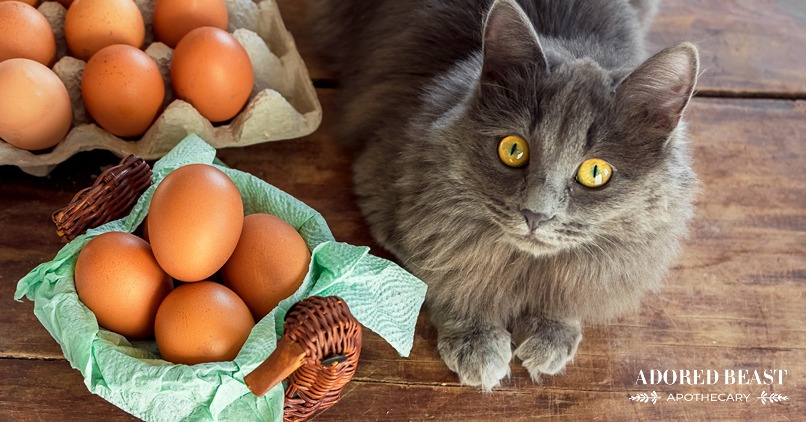We all want the best for our kitties – and feeding a healthy diet is foundational for helping them live the best lives possible. Since cats are obligate carnivores, most of their meals should consist of animal protein – which mainly means meat. But what about eggs? Can cats eat eggs too?
You might be surprised, but this is quite a controversial topic in the feline health world. And we’re going to crack it wide open!
Eggs are – hands down – a superfood. Many people believe (and many studies show) that eggs are the most densely healthful food on the planet because of the vast amount of nutrients they offer. Protein, fat, omega 3s, taurine, vitamins, iron, zinc – all in one perfect little package. The list of documented health benefits from eggs is equally impressive. But are eggs good for cats like they’re good for us?
Our cats can benefit greatly from these nutrients – just as humans can! Studies have shown how adding eggs into a balanced diet can benefit joint health, eye health, cognitive health, and heart health in all mammals.
So, what’s with the controversy?
In the feline health industry, there is an idea that the avidin in raw egg whites can bind biotin and cause a biotin deficiency in cats. However, a cat would have to ingest a heck of a lot of egg whites to suffer from a deficiency – and there’s never been a reported case of this.
Can Cats Eat Eggs Raw?
The biggest controversy (as you can imagine) is about feeding eggs cooked versus raw. Can cats eat raw eggs?
Just as with raw meat, many people fear that raw eggs can cause salmonella or other foodborne illnesses. I once got salmonella poisoning from eating a contaminated egg sunny side up – so I fully understand the fear. However, we humans have a very different digestive systems and gut pH than our feline friends.
A cat’s gut is capable of handling large bacterial loads and their digestive system flushes very quickly. A healthy microbiome will recognize and disallow the growth of pathogenic strains of salmonella. To my knowledge, there has never been a reported case of cats getting sick from eating raw eggs – including ours.
We feed our 6 cats a species appropriate, balanced raw food diet. Many of those meals contain raw, whole eggs (shells included). In 5 years feeing our cats this way (multiple times per day), we have never had a health issue arise from eggs.
That said, you always want to trust your source of eggs. Always look for pasture raised eggs – especially when feeding them raw.
What about Scrambled Or Boiled?
Can cats eat eggs if they’ve been cooked as well?
Still not comfortable with raw? That’s okay! Boiled eggs are an easy way to treat your kitty to the benefits of eggs. Just chop up the boiled egg into cat-sized bites and serve plain.
Scrambled eggs are also an easy treat – if you do it the right way. If you’re like me, I add butter, garlic, onion powder and other spices in my scrambled eggs. This is not how to make scrambled eggs for cats. Instead, either use a small amount of coconut oil (in replacement of the butter) or use no additives and just scramble the egg plain. Let the egg cool and serve (our cats love this tasty treat).
Can Cats Eat Eggshells?
For adult cats and seniors especially, eggshells are a fantastic source of calcium that they digest very well. When two of our cats were diagnosed with kidney disease, we started feeding them a raw diet that used eggshell calcium in replacement of bone. This helps lower the phosphorous levels and is easier on the kidneys of senior cats. Along with some supplementation, this diet helped stop the progression of CKD in both of our kitties.
If you make your own balanced fresh food diet at home, here’s a quick recipe on how to make eggshell powder for calcium:
- Save your eggshells after removing the eggs
- Boil eggshells in a large pot of water for 10 minutes
- Remove eggshells from water and let dry completely
- Bake dried eggshell at 200 degrees for 15 minutes
- Grind up baked eggshells into a powder
1/2 teaspoon equals about 400mg of calcium.
**Note: skip the eggshells for growing kittens because they can cause a calcium:phosphorus imbalance and risk of growth problems. For adults cats and seniors, it’s fine!
Here’s a video on how to do this if you’re a visual learner.
While you still need to consider that feeding your cats eggs will increase their calorie intake, adding this superfood into your kitty’s balanced diet is a fantastic, healthy, and tasty treat. Remember to look for organic, pasture raised eggs while shopping – and let us know how your cats like their eggs!












